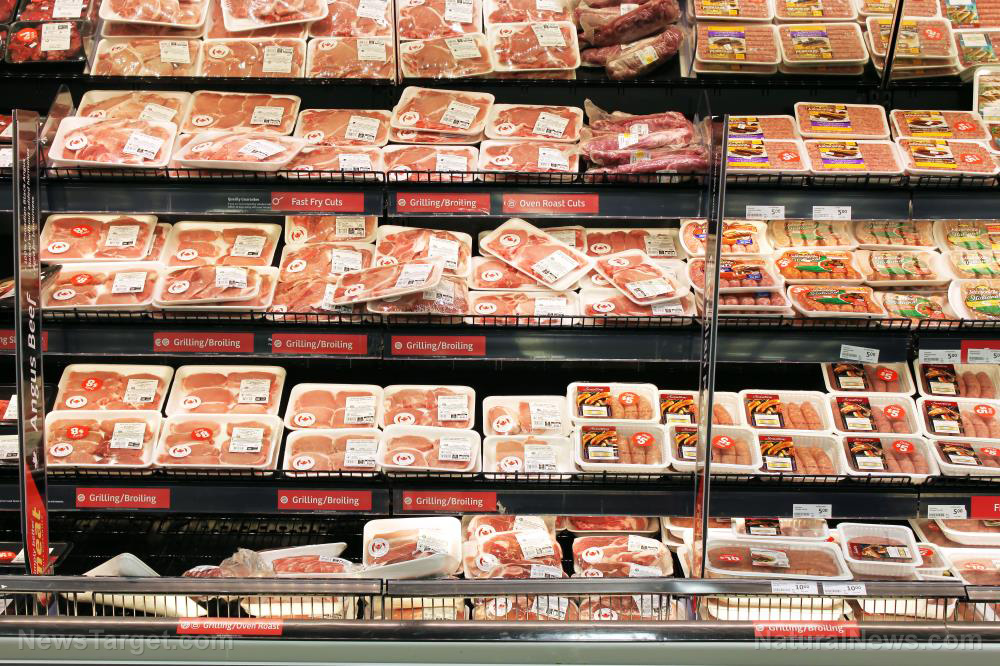 Parler
Parler Gab
Gab
There's a global agenda to pollute, ban, and make meat less accessible
The Guardian reported in September 2019: “The barrister Michael Mansfield has suggested that we should have new laws against ecocide — practices that destroy the planet — and that under them, meat could be targeted. ‘I think when we look at the damage eating meat is doing to the planet, it is not preposterous to think that one day it will become illegal,’ he said.” Research published by Oxford University in 2018 claimed that meat and dairy production are responsible for 60 percent of the greenhouse gas emissions produced by the agricultural sector, and are therefore destroying the planet. The report lambasted cattle ranches for consuming up to 83 percent of available farmland, while providing very little benefit to the human diet. However, meat is a critical source of nutrition, and has become an evolutionary source of sustenance for mankind. Dr. Adegbola Adesogan, director of the University of Florida’s Global Food Systems Institute, wrote about the importance of animal-sourced foods in the human diet. “Dietary recommendations to eliminate animal-source foods from diets ignore their importance,” Dr. Adesogan wrote. “Animal-sourced foods are superior to plant-sourced foods at simultaneously supplying several bio-available micro-nutrients and high-quality macro-nutrients critical for growth and cognitive development.” He pointed to research explaining the importance of meat in the evolutionary dietary patterns of humans throughout history. “The researchers explain that meat offers a source of high-quality protein and nutrients that are not always easily obtained with meat-free diets and are often sub-optimal or deficient in global populations,” he said.Plant-based "meats" and other synthetics do not provide adequate nutrition suitable for digestion and metabolism
There are many fake food projects and synthetic meat investments currently in the works. The Impossible Burger contains a protein called soy leghemoglobin (SLH for short), derived from genetically modified (GM) yeast. Studies show that this protein does not metabolize well and causes weight gain, inflammation, kidney disease, and anemia. Furthermore, plant-based meats do not contain essential amino acids that the body needs and may contain anti-nutrients that prevent the body from absorbing minerals such as iron and zinc. Natural animal meat is more than the sum of individual nutrients and is designed to incorporate with human digestion and metabolism. People who eat a meat-free diet struggle to obtain and metabolize what the body needs, including B vitamins, (B12 especially), retinol, long chain omega-3 fatty acids, iron, zinc, taurine, creatine, and carnosine. There is no research to support the nutritional benefits of cultured, lab grown meats. In the study, “The role of meat in the human diet: evolutionary aspects and nutritional value” researchers speak out against the global plot to eliminate meat intake for environmental reasons. “As a food matrix, meat is more than the sum of its individual nutrients. Moreover, within the diet matrix, it can serve as a keystone food in food-based dietary interventions to improve nutritional status, especially in regions that rely heavily on cereal staples,” the researchers wrote. “Efforts to lower global meat intake for environmental or other reasons beyond a critical threshold may hinder progress towards reducing under-nutrition and the effects this has on both physical and cognitive outcomes, and thereby stifle economic development.” The real problems with today’s meat supply come down to factory farming and the overuse of antibiotics. If regenerative farming practices and permaculture were incentivized over factory farming, then there would be both an environmental benefit and a human health benefit. The soils would regenerate, the diversity of plants would flourish, and the animals would be able to live healthy lives, providing nutrient dense sources of meat for a growing population. There are ways to protect the environment, animal health, and promote nutrition and disease prevention for humans, but these solutions are not being considered on a large scale. Instead, meat itself is being vilified, polluted with mRNA experiments, and restricted. As corporations and governments pretend to save the planet, they will continue to plunder the planet’s natural resources, as they seek to re-engineer life itself and take more profit and control over the food supply. Sources include: WhiteHouse.gov ChildrensHealthDefense.org NaturalNews.com TheGuardian.com JosephPoore.com [PDF] NutritionInsight.com GMWatch.com Academicoup.com TakeControlSubstack.comNYC to begin tracking food purchases to make sure residents don’t consume “too much” meat
By Ethan Huff // Share
Governments continue to obscure COVID-19 vaccine data amid rising concerns over excess deaths
By patricklewis // Share
Tech giant Microsoft backs EXTINCTION with its support of carbon capture programs
By ramontomeydw // Share
Germany to resume arms exports to Israel despite repeated ceasefire violations
By isabelle // Share










